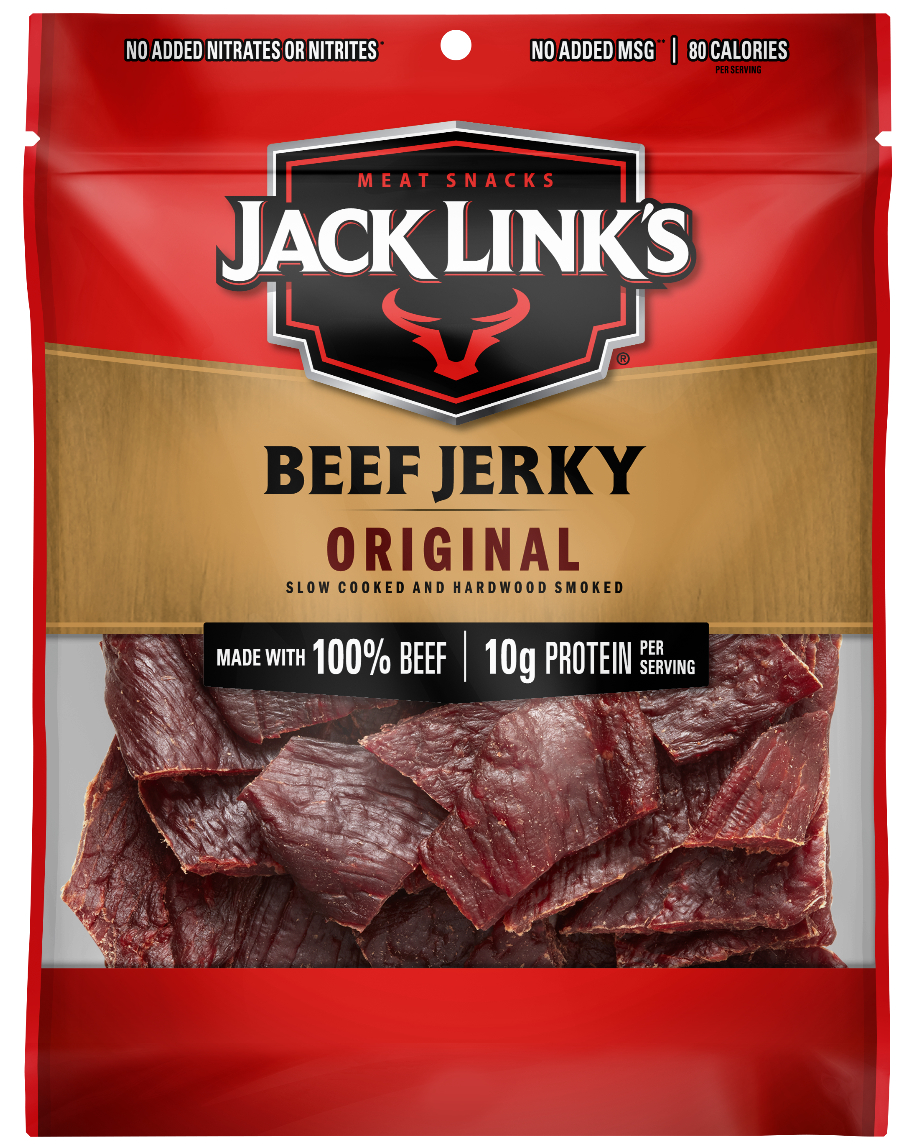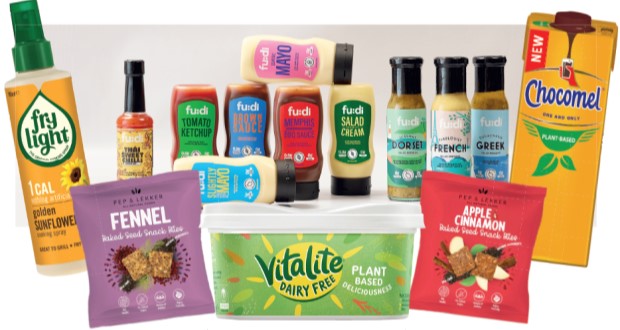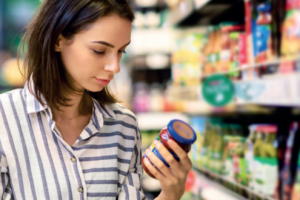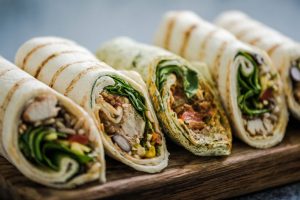In 2023, more than 700,000 people signed up to the challenge to follow a vegetarian diet for January – and Veganuary 2024 looks set to be even bigger.
Fliss Newland, managing director at Just Wholefoods, says: “If 2023’s record participation is anything to go by, the appetite for Veganuary is only growing.
“Whatever the driver – be it for health reasons, for the planet, or for the animals – consumers are on the lookout for plant-based alternatives to their favourites that don’t compromise on taste.”
According to cheese brand Cathedral City, more than six in 10 shoppers want to see healthy snacking options in their local store and want to be able to drop in and top up on healthier alternatives.
So, retailers need to think bottled water, no and low alcohol, low and no sugar food and drink, free-from products, vegan and vegetarian food and drink, and protein-based products.

Portion control
Over recent years, protein-rich snacking items, such as cheese and meat, have become increasingly popular. Reflecting this increased demand, the cheese snack sector has achieved 7.7% value growth in total market in the latest year.
Cathedral City’s cheese snacking range has delivered 9.7% value growth in symbols and independents in the past year. Neil Stewart, head of marketing for Cathedral City at Saputo Dairy UK, says: “Cheese can deliver an indulgent, sensory eating experience while also fulfilling a widely recognised role as part of a balanced diet.
“Via our Cathedral City Minis range and grab-and-go snack bars, we are supporting consumers with a range of portion-controlled snack-sized products.”
Total sales in the jerky and biltong meat snacks category have grown extremely strongly in the convenience sector over the last 12 months – by more than a third in value and more than a quarter in number of units.
The category has more than doubled in value over the last five years, growing in both value and volume, and has the headroom to double again as still fewer than one in 10 households buy into it.
Total sales of jerky and biltong meat are growing at 35% in value terms, and by 27% in units in the convenience sector so far this year.

Huge opportunity
Shaun Whelan, convenience, wholesale and out-of-home controller at Jack Link’s, says: “The jerky and biltong meat snacks category is becoming more popular in the convenience sector as we see more shoppers searching out high-protein, tasty convenient snacks that are seen to be healthier alternatives to traditional snacks.
The opportunity to meet shopper demand and unlock additional sales is huge.”
As well as beef jerky, Jack Link’s has recently launched Ham Snack. Made from 100% lean pork that boasts 50% protein, both Biltong and Ham Snack have no added sugar.
Pork scratchings are also driving their protein credentials, promoted as perfect for mid-afternoon slumps or for a pre- or post- workout snack. Matt Smith, marketing director at Tayto Group, says: “Eight out of 10 consumers said they would recommend Crispy Strips and 73% agreed they are better than their usual meat snack.”
Alongside all this demand for meat and cheese, at the other end of the spectrum completely is the demand for dairy-free and meat-free alternatives. Vegans and vegetarians are projected to make up a quarter of the British population in 2025, but the trend is also being driven by people who live with allergies or intolerances.

Cheese is bought by 42% of all UK households and brands want to make sure their products are accessible to all lifestyles and dietary requirements. Cathedral City launched its Our Plant Based offer in 2022 and says the range continues to go from strength to strength, contributing 44% of the plant-based category’s shopper growth.
“At Cathedral City, we think all cheese and cheese-flavoured products should taste great no matter your lifestyle choice. So, we decided to meet this consumer need by using our knowledge and expertise to create fantastic Cheddar flavour alternatives to cheese products that don’t sacrifice taste, texture or quality,” Stewart adds.
The brand has added a wide range of new options, allowing more shoppers to try plant-based alternatives to cheese. Its products are now available in block, grated and sandwich-slice formats, along with a spring onion and cracked black pepper alternative to soft cheese, an extra-mature block and a Cheddar-flavoured spread.
Lifestyle choice
Lactose-free cheese is now worth £11.2m in the total UK grocery market and Cathedral City Lactose Free 200g block is positioning itself as the perfect option for retailers looking to satisfy customers’ lactose-free needs.
Stewart explains: “While all aged, hard cheeses are naturally low in lactose, Cathedral City is going the extra mile by testing every batch of their Lactose-Free Cheddar to guarantee there is less than 0.01% lactose remaining. So, whether consumers are lactose-intolerant or it’s simply a lifestyle choice, they can still enjoy the great taste of Cathedral City.”

One in three Brits now drink plant-based milk and almost 44% of Brits aged 25 to 44 are plant-based milk users. Hazelnuts, almonds, cashews, oats, coconut and soya are among the myriad of sources, the most popular options being almond milk (22%), oat milk (20%) and coconut milk (17%).
Chocomel has tapped into this growth by launching a new plant-based variant to make sure its products are suitable for all dietary requirements. The plant-based drink has a cashew nut and pea milk formulation.
Sharing format
Katie Chadd, business unit controller at manufacturer FrieslandCampina, says: “Alongside the growth of the move towards ‘better-for-you’ diets, recent research suggests 32% of UK consumers are regularly enjoying plant-based milks and that this growth is expected to continue over the coming year.
Chocomel Plant-Based is also available in a one-litre tetra pack – a format ideal for sharing which has proved a huge success when launched for Chocomel original in the grocery channel last year.”
In line with the plant-based and free-from trend, the appetite for dairy-free spreads is also at an all-time high. The category is valued at £77m, an increase of 20% in the 52 weeks to 30 September 2023. The sector is expected to continue to boom as the number of consumers either not eating dairy or actively reducing their dairy consumption continues to grow.
Vegan confectionery
Lissie Bernard, brand manager for Vitalite, says: “Consumers opting for dairy-free and plant-based alternatives are no longer a niche; according to our most recent panel research, one third of shoppers claim to be actively buying dairy-free spreads at least once every three months, with intolerance to dairy and general health reasons cited as the top reasons for avoiding or reducing dairy.”

As vegan offerings become the norm, confectionery manufacturer Swizzels has seen a surge in sales of its vegan selection, with a 19% increase in its vegan variety range.
Clare Newton, trade marketing manager at Swizzels, says: “Vegan sugar confectionery is becoming increasingly popular as the vegan demographic starts to seek options that move away from their staple diet.”
One of the big trends is ‘clean’ eating. Shoppers are seeking out additive-free products with more wholesome ingredients that they perceive to be better for them.
Martin Tilney, senior commercial director at Del Monte UK and Europe, says: “Natural preservation methods such as our additive-free canning process support this trend in that it offers the shopper a product that is freshly packed and preserved, using natural ingredients while still offering the convenience of an extended shelf life.”

Reduced salt and sugar options are also becoming more popular as shoppers seek to reduce their sugar and salt intake.
Consumers do, however, still want taste, so tend to choose the brands they know and trust, of which many have now launched ‘low’ options. Del Monte’s canned fruit-in-juice products present a lower-sugar alternative to the more-traditional fruit-in-syrup products.
Tilney says: “Our fruit-in-juice canned products are recognised as forming part of your ‘five a day’, while still delivering on great taste and quality. We also offer fruit in a light syrup, which some shoppers prefer.”

❚ Stock top-selling SKUs with strong brand names that consumers know and love.
❚ Promote dairy-free and plant-based alternatives to butters and cheese alongside their regular counterparts to give your customers clear information on the range available.
❚ Clearly signpost dairy-free and plant-based products at shelf to make product choice quick and simple for customers.
❚ Make plant-based easy to shop and plan – give shoppers advice for food swaps, recipes or health benefits that they can use to drive sales in-store.
❚ Make the most of seasonal events and themes to create engagement and make healthier options top of mind – capitalise on January’s new lifestyle resolutions with “New Year, New You” or Veganuary theming.
 Talking Retail Grocery and product news for independent retailers
Talking Retail Grocery and product news for independent retailers






